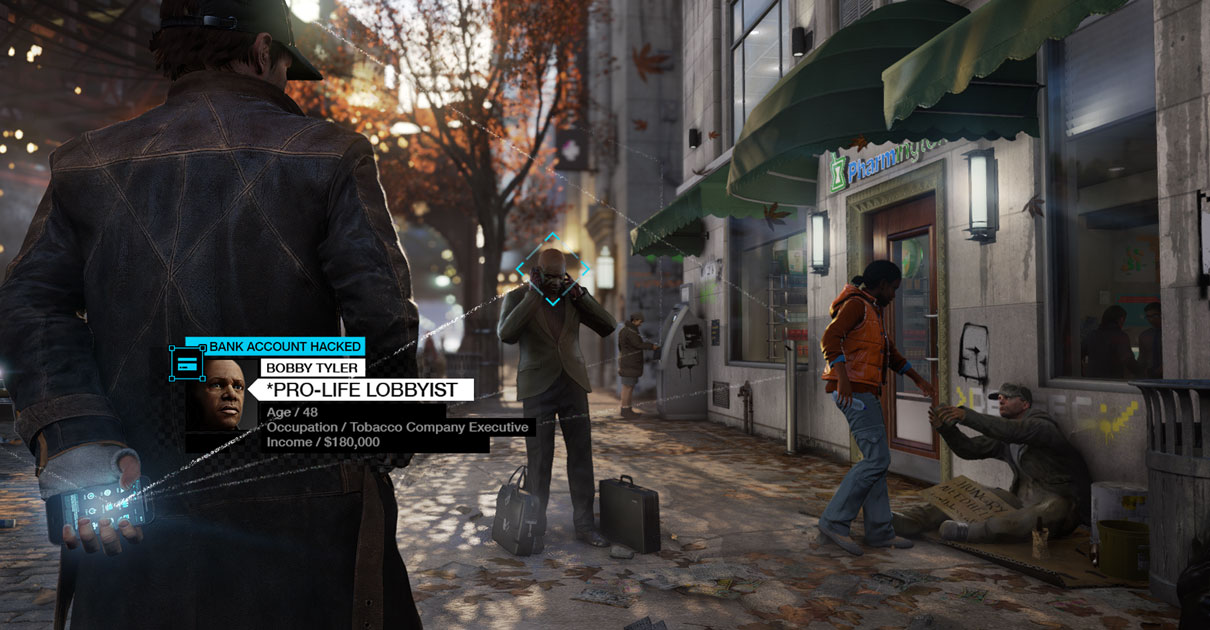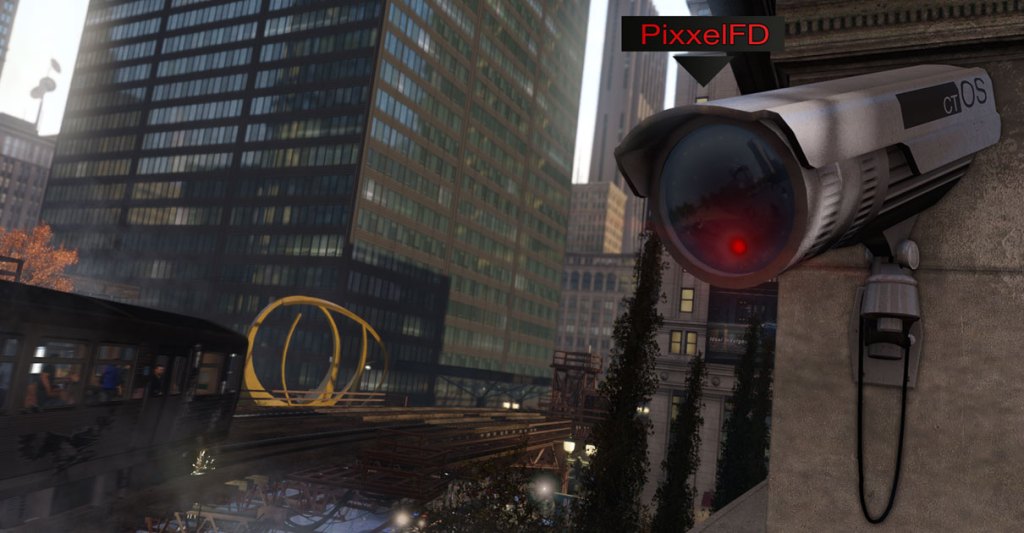Watch Dogs started development several years ago, before its E3 2012 surprise reveal, before iPhone and Android devices became so ubiquitous, and before Edward Snowden blew the whistle on a massive National Security Agency program that monitors your text messages and calls as they happen. Does that sound familiar?
It's because in Watch Dogs, you (playing as Aiden Pearce) can monitor the text message conversations of NPCs around you as they happen. You can watch the messages buzz back and forth, and even determine the moral fabric of an individual as a conversation plays out. That's what I saw at a San Francisco hands-off demo of Ubisoft's open-world Chicago, back in early May.
The connections between the oppressive ctOS system present in Watch Dogs' Chicago and the NSA's communications monitoring aren't as clear as you might think. Sure, both give individuals the ability to monitor, trace, and report, but Watch Dogs gives an individual the power, not just to… well, watch, but also to judge, sentence, and carry out punishment.
In the demo, one NPC angrily texted another, demanding a third NPC's location. The character in front of Aiden wanted to know where his wife's rapist had disappeared to. Given a location, a target, and an aggressor, Aiden monitored the vengeful killing from a security camera. At the time, Animation Director Colin Graham told me that other developers on the team would "rather stop the murder, but it's all a matter of choice."
Even as a third-party to the gameplay in Watch Dogs, I felt summarily "creeped out." I'm not sure I want to play witness to an entire city of competing ideals and motivations, especially when the stakes are so high. I feel like that pressure had to have affected Snowden's decision to alert the world, and that it would lead me to play Watch Dogs like a guardian angel—but what's the perfect solution to the situation above?
Aiden can't time travel, so stopping the rape in the first place is out of the question. Aiden can't drag bodies and hide them in trash cans either, so knocking out the rapist and hiding him before the attacker can arrive won't work either. The only way to keep the attacker's hands clean is to kill the suspect before he gets there, but then Aiden is the villain in the immediate sense.
Thankfully, Ubisoft will allow for much less grave invasions of privacy, with players as both the perpetrator and the victim. At E3, Watch Dogs developers retread some of the open-world ground previously covered in May. They showed Aiden buying weapons and having to run from cops after a breaking news report alerted the shopkeep (who in turn activated a silent alarm). They showed the driving distance from the Chicago slums to a bustling downtown, and then they showed how persistent multiplayer will change your single-player session.

An alert was shown on the player's screen, and a curtain was drawn back to reveal another player actively hacking into Player 1's bank accounts. The developer driving the demo had two choices: he could run away or he could locate the perpetrator. Either would stop the hack, but breaking into an all-out firefight on the streets of Chicago would certainly attract the attention of law enforcement and raise the ctOS threat level.
"Well, he got away, but let's try to get a little revenge," a Watch Dogs team member said. Aiden started a hack on his attacker, and hid behind cover to keep the other player from preventing the theft. The developer controlling the demo hopped in a car to avoid the other player's gaze, but was soon spotted and a high-speed chase ensued.
As entertaining as this digital version of Tag will be come launch day, the less practical uses seem a lot more entertaining. How about invading another player's game, just to monitor and follow them around the world? What if the Player 2 in your Chicago never tries to hack you, but tails you around town, judging your every movement?
I imagine I'll feel the same uncomfortable voyeurism, but multiplied by the real-life-victim factor. I imagine melding Chicago's with other players, only to give them the sense that someone real is watching, even in a game full of unreal NPCs monitoring the player's moves. I imagine creating a secondary save file just to play the dark angel Aiden, a file that I don't mind killing people needlessly or griefing other players with.
Open world games are often defined by the side-missions, un-objectives, and the reactive sandbox within, but I can't think of any that have captured my imagination like Watch Dogs. When it comes to video games, I'm an incorrigible backseat driver. I can't stand watching others play because I feel none of the interaction, none of the "immersion". But that wasn't the case with Watch Dogs. Watching these systems played out ahead of release left me anxious, terrified, electrified.
Every time I've seen this game, I've come away with a darker, more complicated view of the themes in Ubisoft's digital Chicago. None of the choices are so blatant as to require a dialog wheel. None of these situations imply an impact on the over-arching narrative if you address them "incorrectly." None of the clearly defined lines we're used to in video games are apparent in Watch Dogs. If anyone could carry the NSA spying program around in their pocket, how would you use it?







